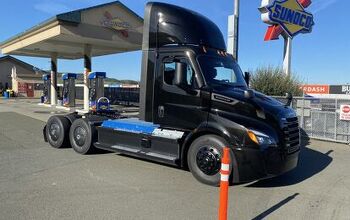IIHS Moves Crash Test Goalposts, Pisses Off Toyota
The IIHS has released its “Top Safety Picks 2010,” and thanks in part to the addition of roof crush tests that exceed federal standards (4x vehicle weight for an “acceptable” score) , a spot of drama has ensued. Not a single Toyota, Lexus or Scion made the list, for example, causing Toyota’s Irv Miller to lay into the IIHS [via Jalopnik].
In 2009, Toyota won more IIHS Top Safety Pick (TSP) awards than any other manufacturer. Toyota continues to improve vehicle passive and active safety, including improvement of past winners of IIHS TSP. IIHS’ statement that Toyota was shut out for 2010 is extreme and misleading, considering there are 38 Toyota, Lexus and Scion models, and only three were tested for roof strength by IIHS: Camry, RAV4 and Yaris. This is the first year IIHS has included its own roof strength tests, which exceed federal standards, for TSP consideration. All Toyota vehicles meet or exceed Federal Safety Standards for frontal and side impact, roof crush resistance and rollover protection.
Well, Toyota, if you play the IIHS’s game (and based on Miller’s TSP-counting, you are) you can’t start whining about losing just because the goalposts were moved. Moving goalposts and exceeding federal requirements is what the IIHS does. The IIHS’s single aim is to continually move the safety benchmark ever upward, without taking fuel efficiency, packaging or any other inevitable design compromises into account. Live by the sword, die by the sword. If meeting federal standards is enough (and it is), just ignore the IIHS like former TSP winners and 2010 losers BMW, Mazda, Mitsubishi, and Saab are. Or better yet, join the debate over whether or not increased roof crush standards actually make cars safer. As it’s played out, Miller’s response serves only to reduce the automaker’s likability factor and lend credence to rumors that Toyota fudges structural issues and hides the truth.
Here are your 2010 IIHS Top Safety Pick Winners:
Large cars
Buick LaCrosse
Ford Taurus
Lincoln MKS
Volvo S80
Midsize cars
Audi A3
Chevrolet Malibu built after October 2009
Chrysler Sebring 4-door with optional electronic stability control
Dodge Avenger with optional electronic stability control
Mercedes C class
Subaru Legacy
Subaru Outback
Volkswagen Jetta sedan
Volkswagen Passat sedan
Volvo C30
Small cars
Honda Civic 4-door models (except Si) with optional electronic stability control
Kia Soul
Nissan Cube
Subaru Impreza except WRX
Volkswagen Golf 4-door
Midsize SUVs
Dodge Journey
Subaru Tribeca
Volvo XC60
Volvo XC90
Small SUVs
Honda Element
Jeep Patriot with optional side torso airbags
Subaru Forester
Volkswagen Tiguan
More by Edward Niedermeyer
Latest Car Reviews
Read moreLatest Product Reviews
Read moreRecent Comments
- Kwik_Shift_Pro4X Mazda CX-5 all the way.
- Spookiness The Mazda interior really is nice. I recognize the rationale for the Mazda infotainment interface design in lieu of a touch screen, but the filthy masses have spoken. As with the rotary engine, it's time to move on. To sell more cars they'll need to have touchscreens. Other carmakers have evolved beyond the iPad-screwed-on-top-the-dash look, so I'm sure Mazda can come up with something aesthetically pleasing and user-friendly. (Another quibble: I really don't need or want AWD, so I wish it wasn't forced. But again, the masses have spoken.)
- Lou_BC “We are always listening to the customer. "You sayin' the baller/gangsta types don't want Escalades on 24's that don't make vroom vroom rumbly sounds?
- AZFelix I shall fully endorse the use of autonomous cars on public roads once they have successfully completed my proposed Turing test for self driving vehicles. This test requires the successful completion of an at fault incident and accident free 24/7 driving session in Buffalo and upstate New York from October 1st until March 31st, and throughout the city of Jakarta, Indonesia for one consecutive year. Only Level 1 and Level 5 vehicles are permissible.
- Lou_BC I'd go Rav4. No Mazda dealer in my town and from what I've seen, Mazda's tend to rust.

































Comments
Join the conversation
Ah, yes, thank you federal nannies for mandating roof crush standards, which create bigger blind spots and higher CGs, and as a result, more accidents. Hmm... seems to me this would create higher premiums - presumably with fewer, or maybe just the same injuries. Thus more kickbacks to the IIHS. Coincidence???
If meeting federal standards is enough (and it is)
Says who, aside from the government, and on what grounds? This assumes the Federal requirements are all based soundly in science without taint of politics or other extraneous factors, and that's not the case. Every Federal Motor Vehicle Safety Standard allows a large range of safety performance, and vehicles that just barely meet the minimum requirements are just as legal as those greatly exceeding them. A vehicle that complies with all applicable Federal Motor Vehicle Safety Standards is not necessarily "safe" (for whatever definition we wish to use), it's merely compliant; vehicles that score well in U.S. safety tests often score poorly in international ECE safety tests and vice-versa.